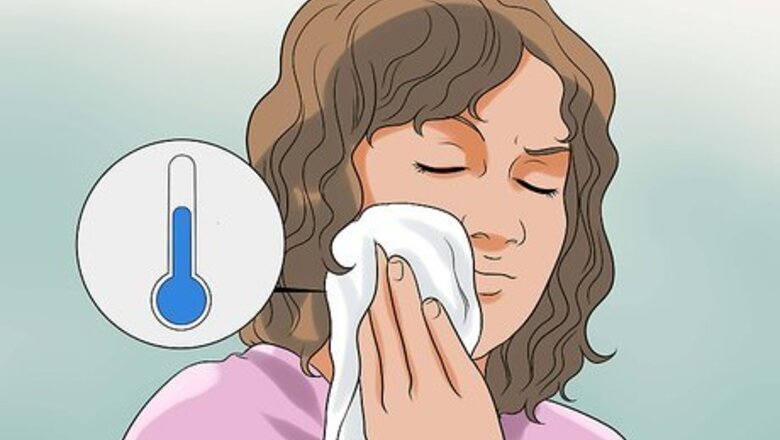
views
Using Non-Prescription Treatments
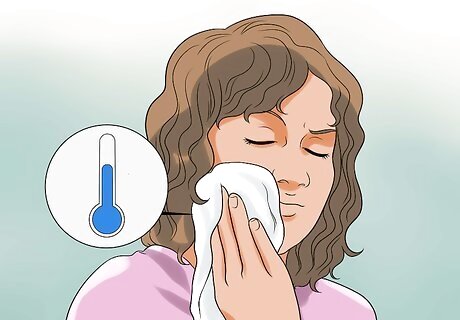
Apply a cold compress to the acne several times a day. Wrap an ice pack, ice cubes, or a bag of frozen food in a clean towel and put it over the acne. You can also use a towel that has been chilled with cold water. The cold can reduce swelling and pain from inflammation. Leave the cold compress on the acne for 10-15 minutes, or until it becomes uncomfortable. Leave it on for longer if it's giving you relief.
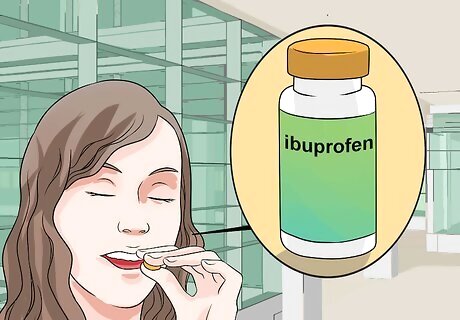
Take ibuprofen or another non-steroid anti-inflammatory drug (NSAID). NSAIDs like ibuprofen reduce inflammation in the body, which can reduce the swelling of your cystic acne. Only take NSAIDs as directed to by the label on the bottle. Stop taking them when you no longer need them, as they can damage or irritate your stomach over time.
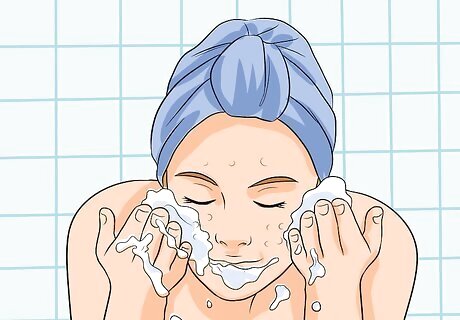
Clean your skin with over-the-counter acne creams and washes. These may not work as well on cystic acne as they do on other outbreaks, but they may help reduce the swelling. Look for products containing the highest available concentration of benzoyl peroxide (10%). Ask a healthcare provider if it would be safe to use a larger amount of the acne cream or face wash than recommended on the package. Benzoyl peroxide treats acne by killing bacteria, removing excess oils from your skin, and promoting healing. It can also reduce the development of new cystic acne. If you have dry skin, start with a product containing a lower concentration of benzoyl peroxide (2.5-5%). Some benzoyl peroxide-based acne treatments contain 3 components: a facial wash, a spot treatment, and a moisturizer, which may also contain salicylic acid.
Making Lifestyle Changes
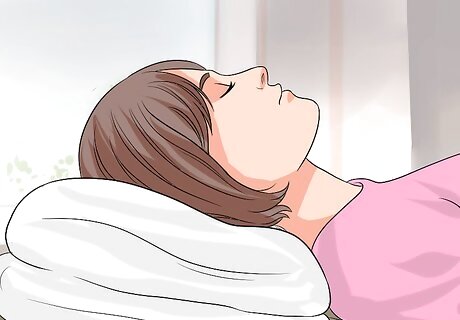
Relax, sleep, and exercise to reduce stress. Sometimes cystic acne outbreaks can be brought on or intensified by high levels of stress. Try to set aside more time for rest and relaxation and see if it reduces your swelling. Regular exercise and getting 7-8 hours of sleep a night can also help lower stress levels. Always shower after exercising to remove sweat, oils and dirt from your skin, since these can contribute to breakouts.
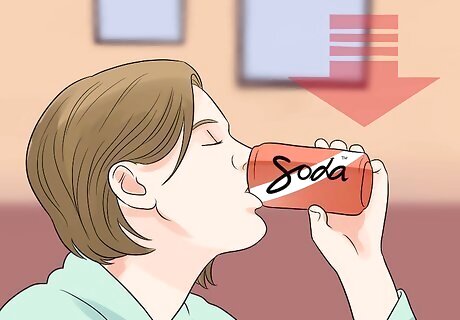
Reduce sugar, dairy, and other inflammatory foods in your diet. Occasionally, high amounts of these foods in your diet can clog your pores or increase the inflammation of your skin. Try cutting refined sugars, white bread, cereals, and milk out of your diet for a week, and see if your acne improves. Even just cutting back on your intake of these acne-causing foods may reduce the severity of your acne, especially if you have been eating more of them than you normally do.
Try foods that fight inflammation. Eating a diet rich in certain types of foods may help calm the inflammation that comes with cystic acne. In addition to cutting out refined sugars, simple carbs, and dairy, you might be able to reduce inflammation by getting more of the following foods in your diet: Fruits and vegetables Healthy fats, such as those found in olive oil, canola oil, nuts, and fish Anti-inflammatory spices, such as turmeric, black pepper, garlic, cinnamon, and ginger
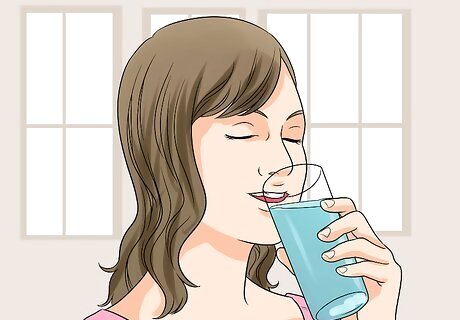
Drink plenty of water to keep your skin from drying out. If your skin becomes dry, it could make your acne worse. Dry skin can also sometimes help cause new outbreaks. The best way to promote moist and healthy skin is by drinking plenty of water. If you have an infection from your acne, staying hydrated will also help your body fight it off. How much water you should drink a day depends on your climate and lifestyle. Usually, doctors recommend that people aim to drink about 8 8-ounce (236 ml) glasses of water a day. Some people may need more, however, and some may need less.
Getting Prescription Medications
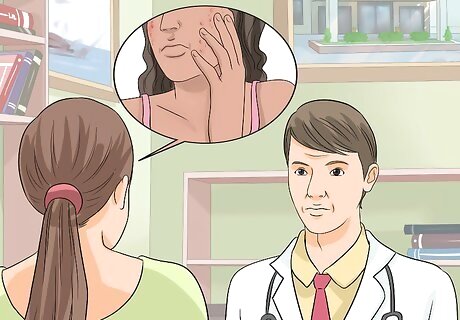
See your doctor if over-the-counter treatments don't work. Try using over-the-counter treatments for a week or so before making an appointment. However, if your cystic acne is highly painful or infected, or if it affects an area close to your eye, call your doctor right away. Your doctor will either refer you to a dermatologist or prescribe medications to treat your cystic acne. Be prepared to tell your doctor about your history with acne and other treatments you have tried.
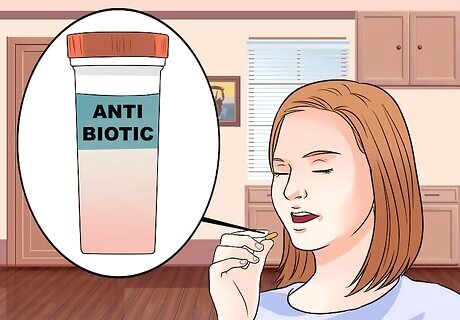
Take antibiotics to fight bacteria and inflammation. Cystic acne can be caused by a buildup of bacteria in your hair follicles. Antibiotics will fight the cause of the acne and reduce the swelling and inflammation. Take antibiotics only as often as directed to and only for as long as necessary. Long-term or excessive use of antibiotics can lead to the development of antibiotic-resistant acne. You may eventually find that antibiotic treatments are no longer as helpful as they were when you first started taking them. Maximize the effectiveness of antibiotic treatments by using them only during severe flareups of cystic acne. You can also boost the effectiveness of antibiotics by using them together with benzoyl peroxide treatments and retinoid creams.
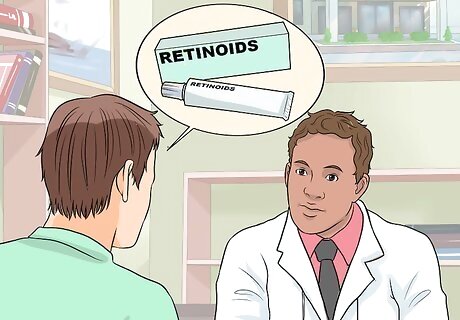
Unclog hair follicles with retinoid creams, gels, or lotions. Usually, you will apply retinoids in the evening and only 3 times a week at first. After a few weeks, your skin will become used to the medication and you can apply it more often.
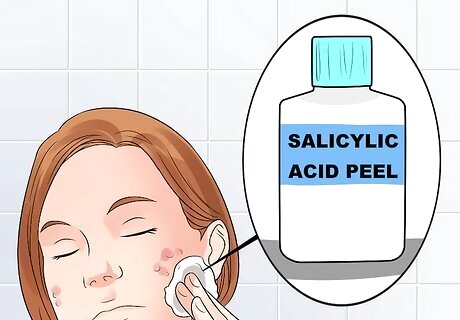
Apply salicylic or azelaic acid to fight bacteria and clear follicles. Like retinoids, put creams or lotions containing these acids directly on your acne. Apply these creams twice a day.
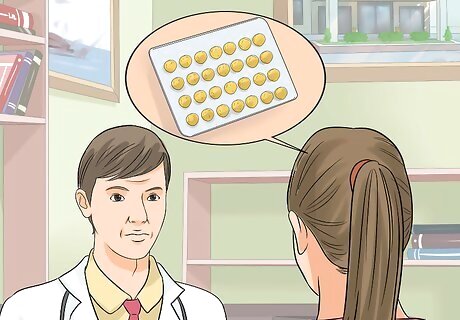
Take contraceptive pills if your outbreaks are related to hormones. You will need to take these pills at a regular time every day to see the most benefit from them. You may not see any changes in your acne for a few months. This option can be good for long-term skin health, but you may also want to ask your doctor for something that provides more immediate relief. Women may also consider taking anti-androgen agents if their acne is related to their hormones.
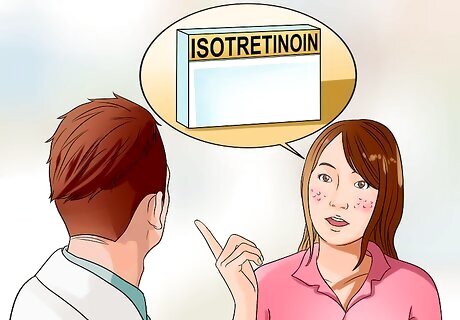
Take isotretinoin if other prescriptions have no effect. Isotretinoin is an extremely strong and effective oral acne medication. However, side effects can include depression and, when taken during pregnancy, severe birth defects. As it can have such powerful side effects, doctors do not usually prescribe it initially. If your doctor does prescribe isotretinoin, they will most likely monitor your health very closely. Do not take isotretinoin if you are pregnant, suspect you might be pregnant, or are trying to conceive.
Treating Cystic Acne with Natural Remedies
Spot-treat your acne with tea tree oil. Tea tree oil has both anti-inflammatory and antiseptic properties and can be helpful in relieving the symptoms of cystic acne. Put 2-3 drops on your finger and gently dab it onto any pimples you wish to treat once or twice daily. Leave the treated area uncovered.
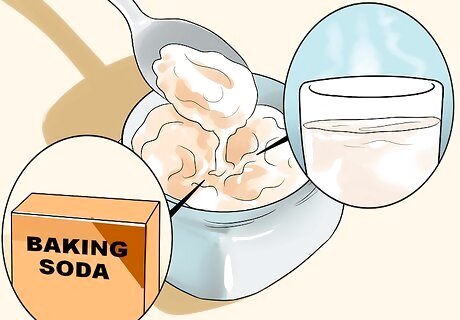
Apply a baking soda and water paste to your acne. Baking soda has antiseptic and anti-inflammatory properties. It can also help clean your pores. Leave the paste on your acne for 10-15 minutes and then wash away with warm water. Add a dash of Epsom salts to your mixture for some added anti-inflammatory benefits.
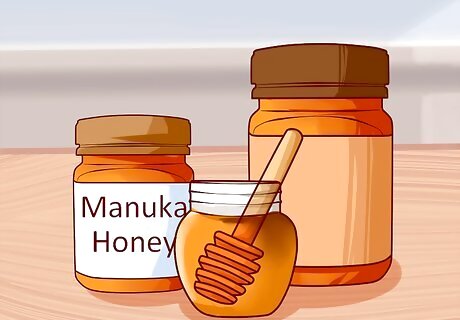
Apply honey for antioxidant benefits. Pour a few drops of honey on your fingertips and then rub them directly on your acne. Leave the honey on for 10-15 minutes and then wash it off with warm water and a clean towel. The honey can work against free radicals in your skin and also absorb oils from your acne.
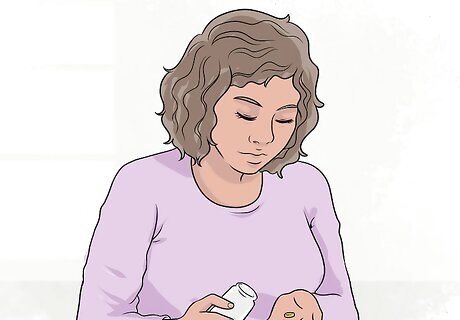
Take a multivitamin daily. Vitamin C can help your body fight off any infection your cystic acne might be causing. Zinc and vitamin A can also help keep your skin healthy and reduce inflammation. Most multivitamins should have all 3 of these and many other vitamins that are healthy for your skin.


















Comments
0 comment